When making the decision to move to the other side of the world, of course you can expect that your daily life will be a little different from the way it is back home. Thanks to cultural differences and language barriers, simple everyday tasks can become both difficult and frustrating. It takes time to adapt to a new life in a new place, and sometimes the culture shock can be a bit overwhelming.
Based on our experiences living and working in Beijing for a handful of years, here are some useful tidbits on what daily life is like in the Chinese capital. As there’s a lot of content here, we’ve created a table of contents that allows you to easily navigate it all:
-
Cost of Living
-
Shopping (Grocery)
-
Shopping (Clothing)
-
Shopping (Other)
-
Bargaining
-
Laundry
-
Housework
-
Getting Around
-
Social Life
-
Stay Connected
-
Money/Banking
-
Health/Fitness
-
Safety
Cost of Living:

The cost of living all depends on which city you are in. For example, in Beijing, it’s very high for China, but it’s low when compared with many other Asian cities, such as Tokyo, Seoul, or Hong Kong. Second and third-tier cities, such as Kunming, are much cheaper.
Wherever you are, your biggest expense will most likely be your rent, especially if you want to live in a nice apartment in a good location (like us). It’s possible to find a very cheap place to stay, but you may be sharing with many others or living on the outskirts of town in a dingy apartment.
Other than that, utility bills, phone/Internet bills, groceries, and public transportation are all quite cheap. We certainly do not lead a frugal lifestyle, but we’ve been able to save a lot of money while still enjoying a somewhat lavish lifestyle (at least for part-time teachers!).
Shopping (Grocery)
If I had a dollar for every time someone from back home asked me what I ate/cooked living in China, well, I’d be able to eat a nice meal, I’ll tell you that much. Actually, there are many options for grocery shopping here:
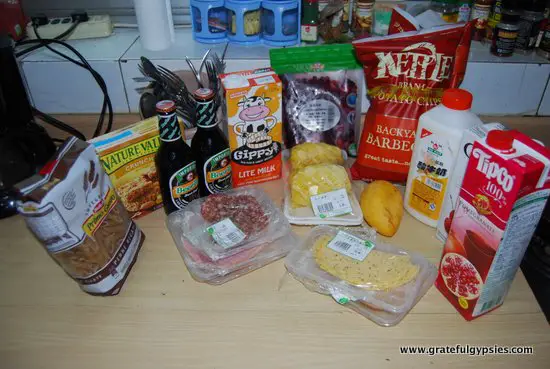
Foreign Grocery Stores: Cities with large foreign populations (Beijing, Shanghai, Shenzhen, Guangzhou) are chock-full of foreign friendly grocery stores. In these shops, you can find delis where you can get sliced meats and cheeses, freshly baked bread, a variety of imported products, and even a huge selection of fine wines.
Of course, shopping this way comes at a price, and you’ll spend significantly more here than at other places. When we do our shopping there for the two of us, we usually spend about $50-60. That buys us some breakfast stuff (fresh juice, yogurt, granola bars), a few lunches (sandwiches, chips, soup), and a few things for dinners (pasta, curry paste, taco seasoning).

Huge Supermarkets: It should come as no surprise that there’s also an abundance of mega-stores in the big cities. In just about any neighborhood, you’re bound to find a Wal-Mart, Carrefour, or BHG somewhere nearby.
Don’t expect the same Wal-Mart experience that you’re used to in the US, though. You won’t be welcomed by retired Chinese ladies and a smile, but you may end up fighting them for the best strawberries. You can find some imported products here, but be prepared for a much more China-oriented shopping experience (think full aisles of rice and instant noodles and things like chicken feet). That being said, you can find most of your everyday items here without spending a fortune.
To be honest, we very rarely use these anymore since we discovered our…

Local Markets: These are the best places to shop, at least in my humble opinion. Chances are there’s one right around the corner from your apartment, and it’s without a doubt far cheaper than the other options. You can choose from a variety of fresh vegetables, fruit, meat, fish, and more.
You can also find plenty of tasty snacks that are prepared fresh for you, such as cold noodles, egg pancakes, or dumplings. I usually load up on stuff here once a week, buying things like salmon, chicken breasts, ground pork, a huge bag of fresh veggies and fruit, and, most importantly, bacon. On average, I spend about $20-30 for the two of us.

Small Neighborhood Shops: Almost every neighborhood in every Chinese city has its own tiny shop. At these local shops, called xiao mai bu in Chinese, you can buy fruit, vegetables, drinks, and smokes. Just below our apartment building, we can buy eggs, potatoes, some veggies, a few bananas, and orange juice – breakfast for two for a total cost of about $3. After a long day of work, you can also grab a cold one for a measly $0.50.
Shopping (Clothing)

Shopping for clothing in China can go both ways. As an average-height, rather skinny dude, it’s pretty easy for me to find clothes that fit here. My feet are an average size, so shoes are no problem, either.
As for Rachel, her curvy American figure doesn’t exactly fit into clothes meant for Chinese girls (who have no hips, boobs, or ass). Some of my tall friends also have a hard time finding clothes or shoes that fit.
That being said, there is no shortage of places to buy clothes in China, and they’re almost always cheaper than they are at home. The exception would be the obvious luxury brands in high-end shopping malls, but why would you want to shop there anyway? Get some knockoff Polo shirts and Gucci shades for much cheaper at the local market!
Shopping (Other)
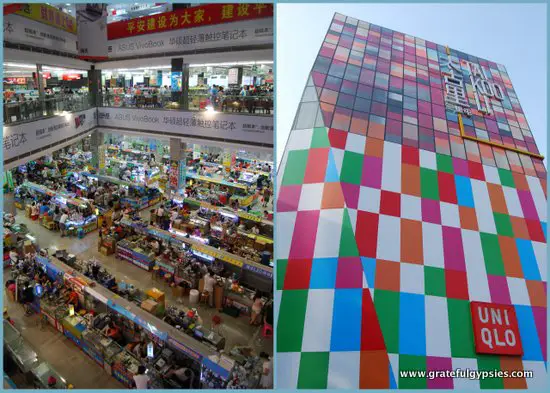
If you’re a shopaholic, then you’ll fit right in here in China. New mega-malls seem to sprout up every day, and you can find just about anything you want if you know where to look.
Take Beijing, for example – there’s a huge electronics district called Zhongguancun that features multiple towers packed full of vendors selling any kind of electronic device imaginable. There are also massive markets such as Jin Wu Xing that sell everything but the kitchen sink (oh wait, they sell those too).
In short, you should be able to find what you’re looking for. Even in smaller cities, there are abundant options for shopping; China has money now and they love spending it.
Bargaining
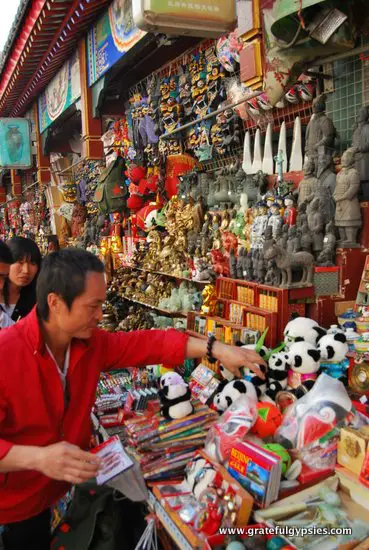
Bargaining is definitely fair game when shopping in China, depending on the place. In general, there are a few places where should and shouldn’t bargain:
When shopping in a large market that targets tourists, you absolutely have to bargain. You will always be quoted a ridiculous price to start, and should never pay any more than 50% of their original offer. Practice your Chinese, use body language, or just walk away until you get a price that you can accept.
The same is true to an extent in the big markets mentioned above (Zhongguancun and Jin Wu Xing). You should definitely bargain here, but don’t expect to get them down to half of the original price.
If you’re in a shopping mall, department store, or even local shops, the price is most likely set and there’s no need to haggle.
Laundry
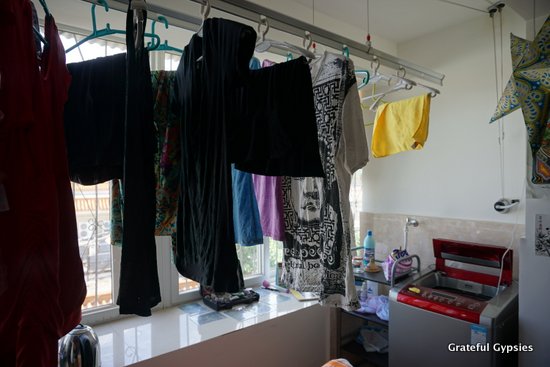
If you’re used to a nice big washer and dryer in a separate room, you’re not going to like doing laundry in China. Expect a small, modest washing machine to come with your apartment, most likely in your bathroom. China does not get down on dryers, either, so get used to hanging your clothes up on a line. That being said, dry cleaning and other laundry services are readily available and are also very affordable.
Housework
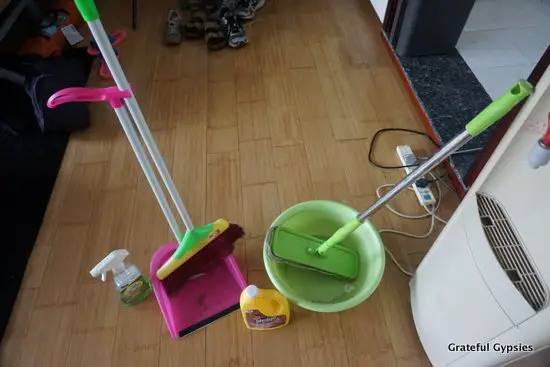
It’s not hard to find all the things you need to do to keep your apartment clean, but it’s even easier to pay someone to do it for you. Housekeepers, known simply as ayi in Chinese, are abundant, do a very thorough job, and charge a very reasonable rate.
Our ayi in Beijing cleaned our three-bedroom apartment from top to bottom once a week for a meager $20. We offered to pay her more, but she insisted that she charged the going rate and not a penny more.
When we moved to Kunming, we didn’t bothered to find an ayi. Our place wasn’t that big and it was just the two of us, we usually had to do a thorough clean every couple of weeks.
Getting Around
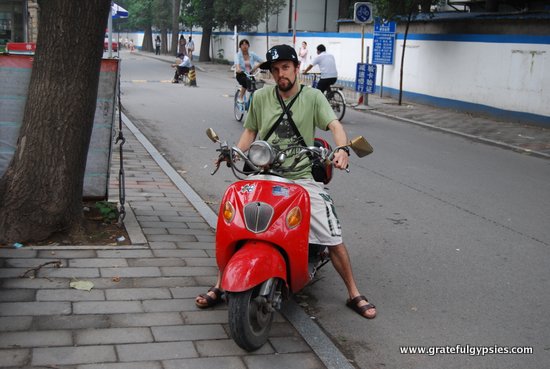
It’s not that easy or straightforward for a foreigner to get a driver’s license and/or a car in China, so we’ve never even bothered. The public transportation here is great and cheap, although it can be insanely crowded.
In Beijing, we usually used a combination of our e-bikes/public transport, while in much smaller Kunming we would just ride or walk. Just beware that getting around Chinese cities can be quite chaotic at times. For more, read up on the culture shock of getting around in China.

Social Life
It’s easy to get out and meet people in the mega-cities of China. There are tons of clubs and organizations you can join here to make new friends, such as sports teams, hiking clubs, alumni groups, or the Couchsurfing community. Most big cities are full of cafes, restaurants, bars, and nightclubs where you can go out for a drink, chat, and meet new people.
There are always cool events going on here – concerts, music festivals, crazy holiday-themed parties like Santa Con, charity events, beer festivals, and much, much more.
Over the years, we’ve made tons of great friends and met so many interesting people both in Beijing and Kunming. That being said, we’ve definitely noticed a difference between the two cities. There’s much more going on in a place like Beijing or Shanghai, but we were happy with the trade-off since we could breathe there and the weather didn’t suck!
As long as you’re a social person, you shouldn’t have a hard time making friends – both foreign and Chinese – while living here.
Back to the Top
Stay Connected
Getting a phone, Internet, and/or cable set-up in China is fairly straightforward, but definitely requires some Chinese abilities or a friend’s help.
Phone service usually comes from one of the big three companies here – China Mobile, Telecom, or Unicom. Plans can be incredibly cheap – I only pay 10 RMB (about $1.5) per month for mine, as I don’t require much data. Even more expensive plans full of data will be much less than a similar deal in the States.
The internet is also very reasonably priced here (around 1,000 RMB/ year for a 4MB connection), but as you may be aware it is heavily censored in China. Consider buying a VPN service before you get here to jump over the Great Firewall. We use Astrill, which costs around $100 a year and works great 99% of the time.
As far as cable TV goes, we have it but never turn it on. It’s possible to get foreign channels like the BBC or CNN, but they’ll come with a high price tag and are also fair game for the Chinese censors.
Back to the Top
Money/Banking
Of course, you’ll be paid in RMB for working here. It’s easy to set up a bank account, and your school or company may even do it for you. You may be paid in cash, or you may get a direct deposit – it depends on who you work for.
Be aware that banks are very crowded around lunch and usually only have one teller working at that time, so it’s best to get in there first thing in the morning or in the last hour of the workday. Expect language barriers, but in bigger banks in the big cities, you should find someone who speaks at least some English.
In terms of changing and sending money home, that can be a pain in the ass. Unless you’re working legally and can prove it with tax forms, you’re limited to changing $500 USD per day at each bank.
Sending money through a bank will involve a lot of headaches, forms, and questions. Thankfully, Western Union is available and is much more convenient (at a price, of course).
If you are working legally and you can prove it, then the whole changing and sending money process is much easier. For example, once we got a form from our company that said how much we (legally) earned, and another form that said how much tax we paid, we were able to change thousands of dollars at one time and send it home all at once.
Back to the Top
Health/Fitness
There are plenty of hospitals in the big cities if you need one. Chinese hospitals are cheaper, more crowded, and probably don’t have English-speaking doctors. There are also many international hospitals, which not surprisingly are more expensive, less crowded, and always have English-speaking doctors. Don’t expect to find these in smaller cities, though.
When it comes to finding medicine, there are tons of pharmacies in the city. Of course, you’ll find mostly Chinese medicine in boxes with Chinese writing sold by Chinese people who probably don’t speak English. As such, you might want to bring a Chinese friend along to help you. Medicine is much cheaper in China than it is in America, but we haven’t had to buy it very often. We usually bring some cold medicine back to China after visiting the US.
Dental care is also readily available and cheap in China. There are plenty of well-qualified dentists, many of whom can speak English, but once again don’t expect this in the 2nd and 3rd tier cities. If you don’t have dental insurance back in the US, you may want to save that trip to the dentist for when you come here.
In terms of staying fit, you’ll find lots of gyms and fitness centers in most cities. We belonged to a nice gym for two years, and a membership cost us about 2,000 RMB for the year. While there are plenty of places to run or cycle, it’s not recommended on days when the pollution level is high (which is most days).
For those who love the great outdoors, consider a city like Kunming or Guilin instead. If going to the gym isn’t your thing, there are plenty of sports organizations here, as well as things like hiking groups, dance classes, and of course martial arts. Or you can always get your swell on in the free fitness parks with retired Chinese folks.
Back to the Top
Safety
In general, China is a very safe place to live, especially Beijing. This is thanks in part to the fact that the government is there, and most Chinese people are terrified of them.
That being said, there are certainly some common crimes here, especially pick-pocketing and petty theft. Around the time of the Spring Festival, this becomes a serious problem on buses and subways, as people make a last minute dash to afford tickets home or gifts for family members. It’s a huge loss of face in Chinese culture to not make it home for the holiday, and it’s even worse to make it home with empty hands and pockets.
You’re also advised to use caution when hanging out in the major nightlife spots. There have been countless incidents of drunk locals starting fights with foreigners, and it will never end well if you’re the latter. No matter who started it or what happened, your lao wai ass will always be the first one thrown in jail. Learn to walk away, don’t provoke, and just use your head.
Back to the Top
Now that you understand a bit more about daily life in China, it’s time to adjust to the inevitable culture shock and learn some Chinese.